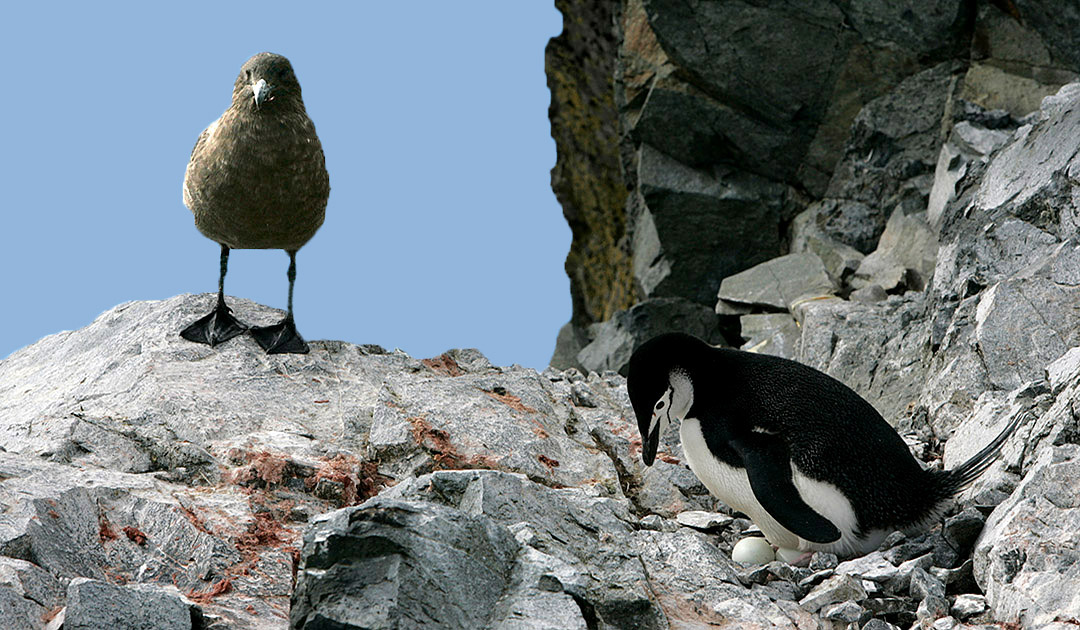
The highly pathogenic bird flu has reached Antarctica: the H5N1 virus has been detected in two dead skuas found near the Argentinian Antarctic station “Primavera” on the Antarctic Peninsula. The greatest concern is now for the numerous penguin colonies on the continent.
Unfortunately, it was only a matter of time before the first birds carried the highly pathogenic virus to Antarctica. On February 24, Spanish scientists confirmed the presence of H5N1 for the first time, according to a press release from the Spanish Ministry of Science, Innovation and Higher Education. Argentinian scientists from the “Primavera” station had handed over the samples from two dead, unspecified skuas to the Spanish Antarctic station “Gabriel de Castilla” on Deception Island for analysis.
The Scientific Committee on Antarctic Research (SCAR) reports further suspected cases in Brown Skuas (Stercorarius antarcticus), South Polar Skuas (Stercorarius maccormicki) and Kelp Gulls (Larus dominicanus) discovered in Hope Bay on the Antarctic Peninsula on its website.
“This discovery demonstrates for the first time that the highly pathogenic avian influenza virus has reached Antarctica, despite the distance and natural barriers that separate it from other continents,” the ministry’s announcement said.

The H5N1 virus has been spreading worldwide since 2021, leaving millions of birds dead, but mammals are also affected. End of October 2023, it was detected for the first time on the sub-Antarctic island of South Georgia, where elephant seals and fur seals have since fallen victim to the virus in large numbers alongside skuas, giant petrels, Antarctic terns and Kelp gulls. The first confirmed cases of bird flu in penguins were reported by SCAR in January this year from the Falkland Islands, where two gentoo penguins died from the virus. However, a suspected case in a dead king penguin, which was also found on South Georgia in January, does not appear to have been confirmed.
Even though penguins seem to have hardly been affected so far, there is great concern for the colonies in the Antarctic and experts fear a catastrophic mortality rate. Penguins breed in very dense colonies, which makes it easier for the virus to spread quickly. “If the virus does start to cause mass mortality events across penguin colonies, it could signal one of the largest ecological disasters of modern times,” a British research team writes in a preprint that has not yet been peer-reviewed.

“The problem is how long is it going to take before it transmits to other species like penguins. We need to monitor that,” Antonio Alcamí, a researcher from the Spanish National Research Council who works at the Centro de Biología Molecular Severo Ochoa CSIC, which is located at the Spanish Antarctic base and studied the carcasses, told The Guardian. “I’m afraid I think it probably will transmit into penguins. The skuas live pretty close, and so there are many opportunities for transmission, but we will see.”
We can only hope that emperor penguins do not come into contact with the virus before their breeding season begins in April. For Adélie penguins, chinstrap penguins and gentoo penguins, it is hopefully a blessing in disguise that the virus did not reach Antarctica until the end of the breeding season. Their chicks have already fledged or are about to fledge. Just as their parents, they will spend the winter in the Southern Ocean, where the penguins have much less contact with each other and with skuas and are therefore less likely to be infected.
But even if the Antarctic penguins are spared this year, it will probably only mean a postponement.
Julia Hager, PolarJournal
More about this topic:





